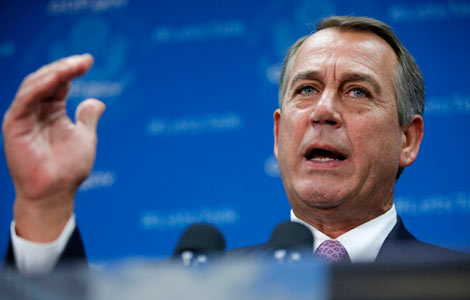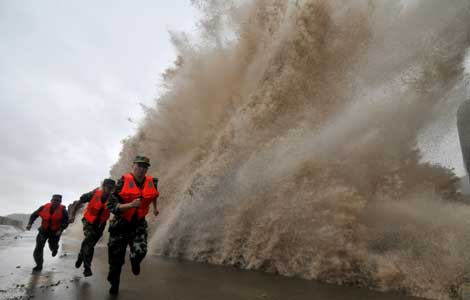Wolf law throws a wrench in the gears of science
Updated: 2013-10-07 11:08
By Chris Davis (China Daily)
|
||||||||
The prospects for more cooperative project between China and the US in outer space grew dimmer this past week, even as NASA administrator Charles Bolden visited Beijing and met with Bai Chunli, president of the Chinese Academy of Sciences.
According to a statement released by the academy the two men "exchanged frank opinions on pragmatic co-operation in relevant fields in the future" and that's about it.
Bolden was in China to attend the 64th meeting of the International Astronautical Congress, which is attended by scientists and administrators from all of the world's space programs. The decision to stage the largest gathering of space scientists in Beijing, according to the Economist, is a sure mark that China has arrived as a major space power.
Bolden's Chinese counterpart, Ma Xingrui, top man at the China National Space Administration (CNSA), told the assembly about China's plans for the near future, including a robotic Moon rover set to take off in December, and a permanent orbiting space station by 2020.
Bolden also addressed the meeting but by US law was forbidden from speaking with Ma or anyone working for the CNSA. The law in question is an aggressive measure pushed through by Congressman Frank Wolf, who chairs the House appropriations committee that controls NASA's purse-strings, restricting foreign nations' access to NASA facilities, as a way to reduce the risk of espionage.
In his remarks, Bai thanked the US for its help with Chinese space programs, especially in building its satellite-tracking ground stations and in the three-dimensional mapping of the Earth from space.
Bolden told the group that NASA was "highly serious" about working with CNSA, especially in projects involving Earth observation from space.

The Wolf law led to an even more ridiculous embarrassment last week as scientists were getting ready to attend a conference on NASA's Kepler space telescope program, which has been searching beyond our solar system for Earth-like planets. The conference - the major annual event for scientists working in this field - is scheduled to take place at Ames research center, a NASA facility, and since the Wolf law forbids any foreigners to set foot on NASA property, Chinese nationals began having their applications turned down.
Many US scientists were rightly outraged and are withdrawing from the conference, charging that Chinese students and researchers in their labs were being discriminated against, the Guardian reported.
One of the most prominent - University of California, Berkeley's Geoff Marcy - called the ban "completely shameful and unethical" and withdrew from the conference. "In good conscience, I cannot attend a meeting that discriminates in this way. The meeting is about planets located trillions of miles away, with no national security implications," he wrote in an email to the organizers.
The conference will be discussing data from the Kepler telescope that is available to anyone online for free, prompting the Economist to write: "It is hard to fathom what secrets any supposed Chinese spies would have been able to pilfer at a conference devoted to alien planets."
Chinese applicants learned of the ban in an e-mail from Mark Messersmith, a Kepler project specialist at Ames. "Unfortunately federal legislation passed last March forbids us from hosting any citizens of the People's Republic of China at a conference held at the National Aeronautics and Space Administration. Regarding those who are already working at other institutions in the US, due to security issues resulting from recent Congressional actions, they are under the same constraints," the Guardian reported.
The language of the Wolf law is so broad that when rumors of espionage at NASA surfaced a few months ago, Bolden stretched the law to ban not only Chinese visitors to NASA facilities, but also people from Eritrea, Iran, North Korea, Sudan and Burma, the Economist reports.
Yale astronomy professor Debra Fischer found out about the ban when a post-doctoral candidate from China in her lab was rejected from the conference. She told her students, "I cannot say don't go, but I'm boycotting the meeting." Her entire team withdrew as well.
"It's completely unethical for the United States of America to exclude certain countries from pure science research," Marcy told the Guardian. "It's an ethical breach that is unacceptable. You have to draw the line." He added the Wolf law would harm relationships built up between US and Chinese researchers.
Oxford University astronomer Chris Lintott told the Guardian, "The Kepler team should move their conference somewhere else - and I hope everyone boycotts until they do."
Contact the writer at chrisdavis@chinadailyusa.com
(China Daily USA 10/07/2013 page8)
Most Viewed
Editor's Picks

|

|

|

|

|

|
Today's Top News
Academics evaluate China at conference
Experts examine core values of China, US
China needs to export ‘public goods’: expert
Sowing the seeds of new business
Chinese investors visit Silicon Valley
Two Chinese die in plane crash near Saipan
Destroying Syria's gas arms started
Direction charted to resolve disputes
US Weekly

|

|














